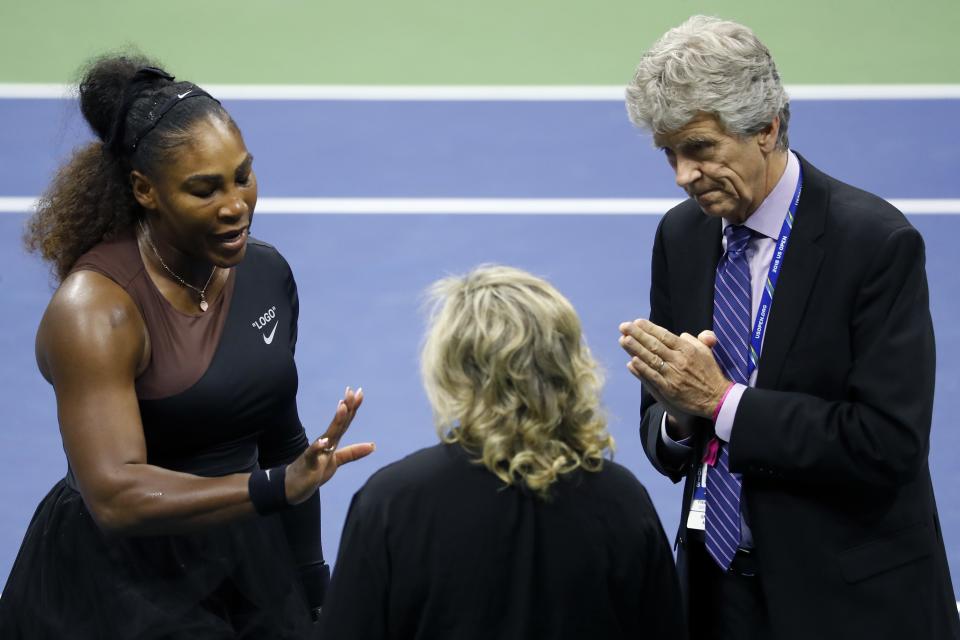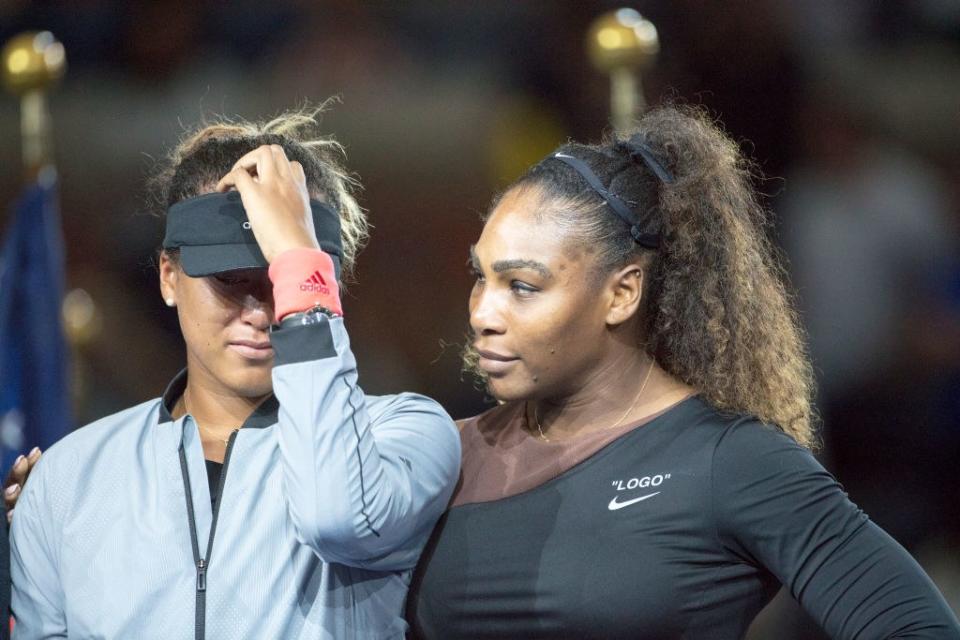At the U.S. Open, Serena Williams Demanded the Apology All Black Women Deserve
When Naomi Osaka was in the third grade, she chose the subject of her class report carefully, settling on her idol before coloring her paper. It was Serena Williams, already a powerful force in the tennis world, already the type of athlete Osaka dreamed of being. And on Saturday, the world watched as the young woman finally faced off with Williams in the 2018 U.S. Open Finals. It was a full-circle moment—when Osaka was just a toddler, Williams was taking home her first Grand Slam title in 1999.
More than being a special moment between two women who love the game, it was also a rare show of diversity in the exclusive, male-dominated world of tennis. The world would watch a young Japanese Haitian American woman take on a black woman from Compton who rose up the ranks to be one of the sport’s fiercest competitors. It is what dreams are made of; the moments that fill women of color with pride because we know just how unique and improbable they can be.
Instead, what we witnessed were the insidious prongs of sexism and racism: How the world often doles out injustice and insult on women of color, expecting them to accept it gracefully, and when they don’t, chastise them for the rage they instigated.
That’s exactly what happened. Osaka’s win was overshadowed with guilt and anger after Williams was given a controversial series of game code violations. First, a warning because chair umpire Carlos Ramos believed coach Patrick Mouratoglou was in violation of secretly coaching Williams. As an athlete who has never called for on-court coaching or used dishonest measures to win, Williams took offense. “I don’t cheat to win,” she told Ramos. “I’d rather lose.” Understandably angry that her character and integrity had been called into question, Williams received a point penalty for smashing her racket. The game penalty came as a result of Williams calling Ramos “a thief” for the point penalty. (As watchers of the sport have pointed out, this was much less than what men of the sport have shouted out from the court.) Sure, tensions were high. Here was Williams, after coming back to the game ranked lower, having literally fought for her life post-childbirth, being accused of cheating. What came next wasn’t a meltdown. It wasn’t “un-serene.” It was simply what anyone being unfairly accused would do.
“You owe me an apology,” Williams repeated, her finger pointed at the man who ruined both Williams’ comeback and Osaka’s first Grand Slam final. And he did. Ramos exerted his power in an otherwise straight-forward match because he could. And when he couldn't get his way…when he couldn't take the heat Williams was giving him, he took the game (and Osaka's win) away.
The fragility of the male ego does not have room for any woman—much less a black woman—demanding an apology. Nevertheless, Williams persisted in her pursuit of one. She is tired, and rightfully so. From the moment the world was introduced to Serena Williams the tennis star, her existence on the court has been met with the disapproval that only racism and sexism can allow. Refusing to abandon her beaded hair style, Williams didn’t conform to the right kind of black girl for tennis. As she continued to dominate the sport, she has been subjected to unwarranted drug testing.
Her body remains the subject of scrutiny, so much so that officials changed dress code policies around her, despite Williams’ health concerns that warrant specific attire. And what could only be viewed as the peak of sexism, Williams returned to the game only to be ranked lower after missing games to deliver the baby and take maternity leave

2018 US Open - Day 13
Every attempt is made to discredit her success and minimize her legacy. For years, it seemed that tennis wanted Williams to simply be grateful for her space in the room. How dare she demand to be treated equally? After all, she gets to play, and for someone like her, that should be enough.
Related Video: 8 Tennis Fashion Controversies
Black women knew why Serena was angry. We know all too well what it means for someone else’s [perceived] errors to be made our own. We know what it is like for our passionate responses to be read as antagonistic. Even U.S. Open commentators defended and chastised her at the same time, suggesting her tone was inappropriate and that the umpire should have reprimanded her “like a child” to get her to calm down. If Williams, a black woman of considerable wealth and status, experiences this without reprieve, those with fewer resources are left completely unprotected. When she told the umpire, "You owe me an apology," it was for all of us.
Black women deserve apologies for every time our self-advocacy was viewed as threatening and antagonistic. We deserve apologies for all the times we expressed ourselves and were told we could have said it differently. We deserve apologies when we were not believed and the worst was assumed of us. We deserve apologies for consistently telling this country what was in its political best interest and being ignored. Black women are owed apologies for our daily navigation of spaces that require us to be anxiously preoccupied with how our actions could be viewed by others.

US Open Tennis Tournament 2018
Apologies matter. They signal that the offender recognizes their actions were wrong and caused harm. Yet, an apology isn’t the final step. Corrective and restorative actions must be taken. The match may be over, but tennis must reckon with the deeply sexist and racist politics that were at play. Williams deserves better treatment all around, and she’s demanding it.
In her postmatch interview, Williams said, “I’m here, fighting for women’s rights and for women’s equality and for all kinds of stuff…. Maybe it didn’t work out for me, but it’s going to work out for the next person.” And the fight is a necessary. We saw this no more clearly than when Naomi Osaka tearfully apologized for winning. Girls and women of color are taught to apologize for the space they take up in this world. They are to be invisible, and when they are noticed, it is their fault. But the apology wasn't on Osaka to deliver. Systems that believe women of color cannot be victims are the only guilty parties.
Though it will not erase what was stolen from them in this moment (and how Williams, like so many black women before her, was made fixer of the moment when she publicly celebrated a tearful Osaka postmatch), I hope these two professionals get another chance to face each other on the court. And I hope the moment is beyond what Naomi thought possible in the third grade, a moment in which tennis recognizes what an honor it is that Serena Williams and Naomi Osaka choose to play this game, when they could have taken their magic anywhere else.
As Gillian B. White writes for The Atlantic: "Being the best may not be enough to take home the Grand Slam trophy, but Williams is winning at something much more consequential." For challenging the status quo in that way, Williams will always be a winner in the eyes of women of color, who too are owed apologies from society.
We're waiting.
Candice Benbow is a writer and the creator of The Lemonade Syllabus, whose work focuses on faith, feminism and pop culture.

